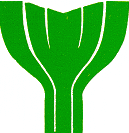
Popularizing the science of agriculture in the Dalmatianregion during the second half of the 18th century was exercising by Venice by way of "academies" that propagated particularly economic activities. In 1767 is established the first academy in Split,the "Societa economica de Spalato", which in addition to agriculture practised the professions of handicraft, trade and fishery. In Zadar in 1787 is founded the "Accademia economico-letteraria di Zara",a similar academy with agriculture as its basic economic activity which into its program included the field of literature, and in Kastel-Luksic in 1788 is established yet another economics academy.
In its report, the Venetian economics council stressed that the academy in Split was successful with a variety of agricultural experiments, advancing in processing leather, processing salted and dried fish, and that it introduced better mills for olives, expanded potato growth and more. A significant contribution to spreading agricultural knowledge was made by the writers of that period who gathered around the academies to write about agriculture. The academies, more or less, have supported their work. The results of their work are manifested in a very rich publishing activity which, regardless of the sparing framework of the printing of the period, has practically embraced the whole problematic sphere: from the olive industry and oil production, viticulture - wine-selling, apiculture, grain growth, cultivation of meadows and other economic means.
The period between 1824 and 1868, the second time the Austrian government ruled the region, was marked by private initiatives of individuals, as is evident in the establishing of a line of "economic societies" across Croatia. In such a way the enlightened part of the Dalmatian population attempted to enhance agriculture as its fundamental economic activity.
In Vienna in 1868 was founded a Ministry of Agriculture, and in 1869 was named the first regional agricultural superintendent (Giovanni Arduino). Organization and enhancement of agricultural production was left to regional leaders whose duties were realized by issuing reports on the status of agriculture to the agricultural superintendent. Furthermore they supervised the usage of resources intended for aiding individual production groups and organized the work of agriculture teachers. In the period between 1870 and 1941 the Dalmatian agriculture directorship position has been awarded to and occupied by 12 persons, each serving his or her term separately, and amongst whom the heaviest trails were laid down by Zotti and Ozanic with their practical publishing work. In 1874 was named the first agriculture teacher (Rikard Antunovic). The service of agricultural teachers slowly developed so that by 1895 there were six agricultural teachers in the Dalmatian region, setting the foundation for an organized agricultural service.
Initial agricultural services and organized agricultural enlightment and schooling, in the second half of the 19th century, occurred under the conditions of awakened national consciousness and tendencies for uplifting the Dalmatian economy, where agriculture had a leading place. In the Dalmatian agricultural production this period marked significant happenings in viticulture. In the 50s, due to the oidium infestation in Italy and France, the Dalmatian viticulture experienced its first great trade prosperity. All available quantities of wine were exported to Italy and priced highly. This was the period of a sudden growth in the number of vineyards and viticultural production. However, the conjuncture only lasted ten years and the Italian viticulturists had found a cure against oidium. T make matters worse the oidium showed its face in Dalmatia. In the middle of the second half of the century the Dalmatian agriculture, mainly viticulture, stretches to significant dimensions with an accent on increased exporting . A formed agricultural administration, expert services, beginning of education and a fortified economy create the conditions and make their request that for the Dalmatian region be established a scientific agricultural institution that would be concerned with scientific questions in regards to agricultural development of this region. In agreement to such a valid request, regarding the institution, the Ministry of Agriculture in Vienna with its decree of July 1, 1894 established the C.K. CHEMICAL - ECONOMIC TESTING INSTITUTE IN SPLIT. On July 15th in 1895., the institutereceived its first Statute.
The establishment of the institute as a scientific analytical-controlled and an educative institution
had a great
significance for agriculture. Its founding represented the first step towards organization in
scientific and
research work in agriculture in Croatia.
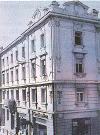 The institute was placed in the rooms of a telegraph office in the today Marmontova street.
The rooms have
been adapted to the needs of the institute many times, and with an adaptation in 1896 they were
divided into
two parts according to their intended service. In the first part was settled a laboratory with
necessary
equipment for research and control work, the other chamber was fixed as an agricultural museum
with a
variety of mechanisms, instruments, models and collections. In this frame work was found an
auditorium were
from time to time were held lectures. The institute in its possession had a library of 4 000 books
in the field
and was receiving 50 magazines. That same year the inventory supply reached the value of 23 826
forints.
The institute was placed in the rooms of a telegraph office in the today Marmontova street.
The rooms have
been adapted to the needs of the institute many times, and with an adaptation in 1896 they were
divided into
two parts according to their intended service. In the first part was settled a laboratory with
necessary
equipment for research and control work, the other chamber was fixed as an agricultural museum
with a
variety of mechanisms, instruments, models and collections. In this frame work was found an
auditorium were
from time to time were held lectures. The institute in its possession had a library of 4 000 books
in the field
and was receiving 50 magazines. That same year the inventory supply reached the value of 23 826
forints.
In the first years of functioning the work of the institute was mostly taking place in the laboratory. Field research, with the cooperation from the Regional Supervision for agriculture and a cooperation from the agriculture teachers service, was done on private lands across Dalmatia and state owned fruit and grape nurseries.
Such work , despite acceptable initial results, could not satisfy all the demands that were placed
on the
institute in the Statute from 1895. At the same time, after the closing of the agricultural school in
Gruz,
reoccurred the problem of agricultural education. For those reasons, according to the words of
the institutes
director of that period (engineer I. Slaus-Kantaschieder),
"work started on establishing a new
agricultural
school which would with theoretical and practical teaching perform a variety of tests of economic
nature, and
it became evident that this school would be incomplete and not accommodate the needs of the
region without
the unification with the already existing Chemical Testing Institute that would serve that purpose
of filling the
gap. This unification created a close bond between the school activities and the Institute under
the leadership
of the same director, and that means a single and constant direction for all activities".
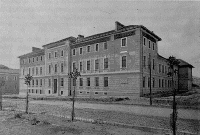
On the 8th of October was established a school in the framework of the Institute which by the
Statute of the
same year was named C.K. AGRICULTURAL SCHOOL AND TEST CANTER IN SPLIT.
To accommodate the needs of the new establishment was erected a large new three story building
in 1907 in
Split's present day Frankopanska 11 street.
The task of the establishment is confirmed by the new Statute on 8th of October in 1905, which reads: This is how, envisioned and with given conditions at the beginning of the century in Dalmatia, was created a modern complex for scientific research and a learning canter capable of executing significant influence on the development of economy of this region.
With analytical work on quality control of food products, (primarily wine and oil) kept were
statistics on
the components and quality of wine. Experimental work was carried out concerning problems
and production
needs. This is the period of sudden decline of wine growing due to phylloxera, but also an intense
period of
renewal of Dalmatian wine growing on American foundations, which is best illustrated by the fact
that in the
period between 1905 and 1910 was out up 15 000 acres of vineyards. It is actually the activity of
that canter
that helped a first vineyard regeneration to occur in Dalmatia in a
relatively short time. In the wine business the quality of Dalmatian wines and
technological procedure of wine processing was tested.
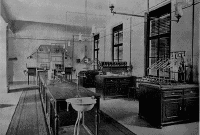
In the olive growing started was a research on olive sorts, agrotechnics in the olive groves, and special attention was given to the production of olive oil. At the same time an intense work was started in researching artificial fertilizer and the efficiency in adapting it to different cultures. Pioneer work was started in researching important diseases and pests of culture plants and their eradication. First chemical analysis of the ground were performed. Significant attention was paid to researching the possibility of introducing new pasture plants, sunflowers, alfalfa, etc.
Along with experimental work, work on agricultural education in Split was carried out with practical exercises in Glavica-Knin, an affiliate.
With the activities of the canter and a well organized service that accommodated the conditions of the time, in a short time of 20 years the Dalmatian agriculture had significantly moved ahead. To the success of the Institute and the development of agriculture in Dalmatia contributed the government in Vienna with significant financial donations whose intensions were to develop Dalmatian economy.
With the creation of the new state of Jugoslavia the canter received a hard blow. The official regulation of 19.12.1918 took away the building from the agricultural department in Split and gave it first to the Trade and later the Technical school. The agricultural school with its inventory was transferred to Glavica by Knin, while for experimental and laboratory activity they were left a tight room in the former building. Testing grounds around the building were first decreased because of the building of an exhibition pavilion, and later because of the building of a high school and other needs.
Neglecting the importance of agricultural research the work of this institution ended up in the framework of the control service. Scientifically experimental work was rendered impossible with the motivation that in Dalmatia research is not needed, and that the results of other institutions in Yugoslavia should be applied. The incorrectness and damage of that stand is not necessary to point out because a whole line of unsolved problems, that the institutes of this region could not nor wish to solve, confirm that.
In 1922 a law concerning research and control stations came out in the Kingdom of Serbia-Croatia-Slovenia.. This law established stations in Topcider, Osijek, Zagreb, Maribor, and Ljubljana. The Institute in Split was not mentioned because no one kept an eye on it.
Such underestimations of the oldest agricultural scientific institute, in Yugoslavia of that time, were not just a reflection of ignorance concerning the specificity of agriculture in the Adriatic region, but a reflection of the political orientation of the central government in Belgrade that systematically neglected the economy in the coastal regions. Only after sharp protests from Dalmatia, the Ministry of Agriculture in 1925 makes a rule by which is established AGRICULTURAL OBSERVATION AND CONTROL STATION, in place of the former Agricultural school and chemical institute.
The decision of the Ministry of Agriculture on 7. May 1925 (# 16275/II) changes the name of the Agricultural school and the testing station becomes AGRICULTURAL OBSERVATION AND CONTROL STATION. With the reorganization of the former establishment that had functioned as an agrochemical and enological institute, within the frame of the law on observation and control stations, founded are other departments: entomological (1925), phytopathological (1929), agrobotanical (1930) and pedological (1929).
The New Station took over the control of food provisions from the former institution (especially wine and alcohol products and the control of different industrial products. It performed this function until the founding of the PUBLIC HEALTH INSTITUTE in Split in 1930.
The activity of wine control is coordinated with the new wine law, and the territory of its authority was widened from Primorska to Zetska and Drinska province.
As production of insect powder became interesting, on the street Nikola Tesla 8 in 1933 was built a special building with a laboratory for researching insect powder.
With the development of the stations scientific research, in 1939 approval was granted for an erection of the new building. The project was drawn up by the eng. Marko Markovina. Unfortunately the upcoming war handicapped the realization of that project.
In the second world war the institution managed to stay afloat under the name STAZIONE AGRARIA ED ENOLOGICA. Its activity was mainly laboratory work. From 1944 to 1946 the institution functioned under the name DISTRICT ECONOMICS STATION, and later under the name REGIONAL AGRICULTURE STATION.
After the 2nd world war and after overcoming the first hardships the station started to focus more on its initial tasks, it reinforced itself with expert and scientific staff, regrouped and spread into Kastel Stari with its objects for olive growing and fruit farming, while in Kastel Luksic it went ahead with viticulture and vegetable farming. At this time was accepted that the Adriatic coastal region with its ecological characteristics was significantly different from the remaining parts of the country, and as a result the problems of agricultural production are specific and demand individual research and answers. Besides that, this region with a surface area of 30 000 square kilometres in its entirety lies connected to the Adriatic rocky terrain, which with its phenomenon gives a main description to the agriculture and forestry of this region.
The regional agricultural station in Split, with respect to long tradition, had indispensable conditions to take over that role, so the government FNRJ on 30.8. 1948 came up with a resolution that founded the FEDERAL SCIENTIFIC RESEARCH INSTITUTE FOR THE ADRIATIC CULTURES.
Giving the Institute a federal character was an intent to tie the scientific research and the advisory activity of agriculture in the Adriatic region .
Research was done according to a single program for the whole region. After two years of functioning under the federal guidance the authorization over the INSTITUTE is taken over by NR Croatia in 1950. In that period, from the Institute, pulled out the institutions in Fazana, Bar, Kastel Stari (1952), and finally the institution in Dubrovnik (1954). After that all scientific research institutions in NR Croatia switched from a budget system to a self financing system. That was a hard period because the institute had to secure the means of survival by doing favours for a variety of economic organizations.
Despite unfavourable circumstances for the scientific research, cooperation with the field was very influential so that in the agricultural production there was not one project that the INSTITUTE was not involved in. In such hard conditions it was impossible to invest in contemporary equipment or pay great attention to the educational aspect and the improvement of the staff.
With the establishment of the Advisory board for the scientific work in 1959 came acceptable
conditions for
scientific research. Although the intended means for that purpose were modest the existing
objects were
enlarged and new research had started on the objects of the INSTITUTE in Kastela and Duilovo.
The resolution of the National committee -district in Split-(06-11 206/1) on 27.9.1960 returned
the earlier
detached institutes for olive growing and fruit farming in Kastel Stari to the INSTITUTE. By the
resolution
of the Executive council of the parliament of NR CROATIA (03/3-21286/1-330) dating
1.11.1962 the institute
for forestry and hunting research of NR Croatia is rearranged so that the forestry testing institute
in Split is
attached to the
INSTITUTE. The forestry problematic of the Adriatic region and the improvement of forest
surfaces on rocky
terrain had fallen under the authorization of the INSTITUTE.
Because of the mentioned reasons or increase in the activity concerning erosion and
improvement, the
district Assembly in Split brought a decision 03-12367 on 24.8. 1964 concerning the change in the
name of
the INSTITUTE to : INSTITUTE FOR ADRIATIC CULTURES AND THE IMPROVEMENT
OF ROCKY
TERRAIN.
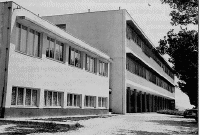
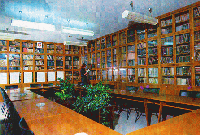
In `1964 on location in Duilovo-Split a new office building was erected providing an
adequate
2500 square meters for laboratory and other types of activity.
The work of the INSTITUTE in that period was done through organizational unit-d epartments.
The INSTITUTE on its developmental path, in a variety of forms and intensity had nurtured the educational activity. Developing that activity it came to see the necessity of institutionalizing long term collaboration between the institute and the college of agricultural sciences (University in Zagreb), so on 11.11. 1977 a mutual agreement was signed concerning the establishment of CANTER FOR THE MEDITERRANEAN AGRICULTURAL STUDY.
The canter for the Mediterranean agricultural study represented an organized form of tieing the INSTITUTE to the Adriatic cultures and to the improvement of rocky terrain in Split to the College of agricultural sciences in Zagreb, whose participants realized a long term relationship and a mutual interest with the goal of satisfying educational needs and developing the scientific research in the agricultural sphere of the Mediterranean.
The signers, concerning mutual activities in the work of the Canter, used the following organizational forms:
In accordance to the agreement, in the framework of the Canter, organized was a post-graduate study for a masters degree in the field of Mediterranean gardening in 1979/80. (22 attenders) and a post graduate study for a masters degree in Mediterranean horticulture (fruit growing) in 1980/82 (17 attenders). At the same time the INSTITUTE organized a significant number of seminars and advisories, with which it contributed to educating professional sectors in the scientific predictions of partial and general problematical aspects of agricultural development of this region.
The activists of the INSTITUTE participated and were leaders of many regional, national, and
international
scientific seminars and conferences. Through these seminars they established and maintained a
collaboration
with all kin scientific research institutes in the country and abroad. For their work they are
awarded with
many prizes and international recognitions
Doctorate thesis
Master thesis
Significant success was realized in collaboration with different institutions from other countries.
The
following project were realized.
A hundred years has past since the founding of the Institute.In that long lasting period the Institute as a product of the centre in which it was created and functioned, experienced all development phases of the social and economic development of the region, especially the development of the agricultural politics. Created as an institution with the task of advancing agricultural production in the Adriatic region with scientific research, it had performed those duties in accordance with the demands and possibilities of the times. To narrow it down, its development was an integral part of the development of agriculture in the region. As production developed, and as consciousness concerning the need of the scientific approach towards solving problems developed, the Institute was there to oblige those requests. How much has the Institute done, to contribute to the practical solving of scientific research concerning development of production, is unquestionable and self supportive in the many years it acted as a developer of scientific thought concerning agriculture with which it enriched the Mediterranean area.
The last decade the Institute had functioned as an independent scientific research facility and member of the university in Split. It still bases its activity on the scientific research in the field of bio-technical sciences. The Institute is well informed on the project and control work from the field of agriculture, nutritional technology, forestry and ecology.
The projects are very actual even for contemporary mes. During suggestions and the selection of research projects considered were the demands of potential users ( agriculture, forestry, water industry, spatial planning, the conservation of human habit) and of research trends in the world.
Scientific research covers a wide area. Part of the work is done in experimental objects in the field and part in the Institute, its laboratories and cabinets.
We would like to mention a few significant projects that have been elaborated on by the team work of our scientist from different fields (agronomists, biologists, chemists, technical nutritionist, forestry scientist): 1. The creation of new cultivations and the improvement of technology primarily of plant production 2. Enriching genetic capacities of agricultural cultures of the Adriatic region in the Republic of Croatia 3. Forming and maintaining the plant genepool for the gene banks 4. Taking care of forests on rocky terrain intended for stock-breeding 5. Socio-economic changes in the agriculture and villages in Dalmatia
During the civil war (1990-1992) the scientific research team of the Institute worked on the project: Management and Marketing of the nutritional agricultural system - food and nutrition in the war conditions (the disposition of regional projects)
The Institute, on its objects, maintains a collection of indigenous domesticated and newly introduced plant sorts (from all Mediterranean and other countries of the world). The collection is kept for the creation of a gene bank and the need of creating new plant sorts applicable to this area.
The meaning of science in the production of food can be observed in the creation of new gene capacities and contemporarization of the nutritional technology. Implementing new technology is only possible through permanent activity in the scientific research service and not only in the theoretical orienting, but with presence in the direct production. Advancement of the nutritional technology hides in itself the danger of surpassing our knowledge in biological characterization of provisions and their natural and additive components.
We must not forget that the intolerable contamination of provisions presents a potentially large, not yet observable danger to the genetic, health, psychological and physical development of man. Concerning the mentioned, the Institute workers, beside fundamental research, must contribute to the "intelligent production" of food and supply of the market, with the intent to warn in the production of the "reflex" so we could be sure to believe in the prolongation of life.
The law on scientific research (25.10. 1993),actually the law on institutions (NN no. 76/93) gave the Republic of Croatia founding rights over the INSTITUTE FOR THE ADRIATIC CULTURES AND IMPROVEMENT OF THE ROCKY TERRAIN - SPLIT, which continued with work as a public Institute under the ownership of the Republic of Croatia.
In accordance with the law on scientific work, work was done on internal orientation (The Statute of the Institute in accordance with the law and the decision on the founding).